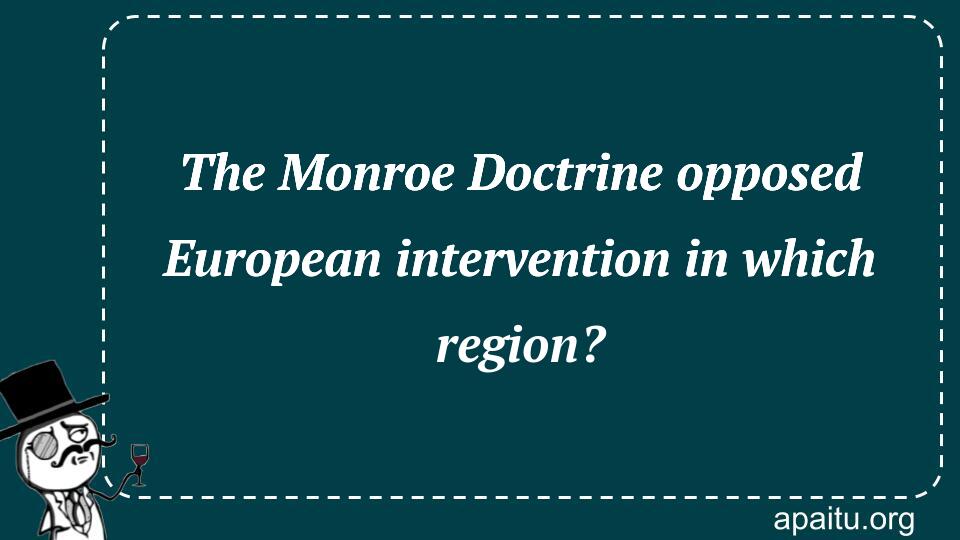Question
Here is the question : THE MONROE DOCTRINE OPPOSED EUROPEAN INTERVENTION IN WHICH REGION?
Option
Here is the option for the question :
- Asia Pacific
- Western Hemisphere
- Antarctica
- Middle East
The Answer:
And, the answer for the the question is :
Explanation:
The Monroe Doctrine was a portion of President James Monroe’s annual address to Congress on December 2, 1823. According to the theory, the Old and New Worlds must continue to exist as separate spheres. Monroe declared that the Western Hemisphere was closed to further colonisation and that the United States would not meddle with any already-established colonies there. Any attempt by a European power to rule a country in the Western Hemisphere would be seen as an aggressive move towards the United States.

The Monroe Doctrine, a cornerstone of American foreign policy, emerged during a time when the United States sought to protect its interests and establish its dominance in the international arena. This doctrine, articulated by President James Monroe in 1823, opposed European intervention in the Western Hemisphere. Its primary objective was to safeguard the newly independent nations of Latin America from European colonization and to assert the United States’ influence in the region. Join us as we delve into the history and significance of the Monroe Doctrine and its impact on the Western Hemisphere.
During the early 19th century, many Latin American countries were gaining independence from European colonial powers. The United States, having recently emerged as a sovereign nation, viewed these newly independent states as kindred spirits and potential allies. President Monroe recognized the need to protect the stability and sovereignty of these nations, fearing that European powers might attempt to reassert control over the continent.
In his annual message to Congress in 1823, President Monroe presented what would become known as the Monroe Doctrine. It declared that the Western Hemisphere was to be considered off-limits for any further European colonization or intervention. The doctrine aimed to prevent European powers, particularly Spain and Portugal, from seeking to reestablish their dominance over the newly formed nations of Latin America.
The Monroe Doctrine was grounded in the belief that the United States had a unique role to play in the Western Hemisphere. It asserted that any European attempt to extend their political influence or control over the region would be seen as a threat to American interests. The doctrine’s primary objective was to create a buffer zone between the Old World and the New World, allowing the United States to exert its influence and establish itself as the dominant power in the Americas.
While the Monroe Doctrine initially had limited immediate impact due to the United States’ relatively weak military capabilities at the time, its significance lay in the long-term implications it held for American foreign policy. The doctrine served as a warning to European powers that the United States would view any attempt to interfere in the affairs of the Western Hemisphere as a hostile act. It laid the groundwork for the United States’ position as a regional hegemon, protecting its own interests while championing the self-determination and independence of Latin American nations.
Over the years, the Monroe Doctrine evolved and expanded in scope. In the late 19th and early 20th centuries, the United States used the doctrine to justify military interventions and political involvement in various countries across the Western Hemisphere. This interventionist approach often resulted in mixed outcomes, with some nations benefiting from U.S. involvement while others faced challenges to their sovereignty.
In the 20th century, as Latin American countries increasingly asserted their independence and pursued their own foreign policies, the Monroe Doctrine faced criticism. Some viewed it as a tool for American imperialism and interference in the affairs of sovereign nations. As a result, in the early 21st century, the United States shifted its stance and acknowledged the need for a more cooperative approach with Latin American nations based on mutual respect and shared interests.
Nevertheless, the Monroe Doctrine remains an important historical milestone in American foreign policy. It symbolizes the United States’ desire to protect the sovereignty and independence of nations in the Western Hemisphere and its aspiration to maintain its influence in the region. While the specific provisions of the doctrine may have evolved over time, its fundamental principle of opposing European intervention in the Western Hemisphere continues to shape American foreign policy to this day.
the Monroe Doctrine stands as a testament to the United States’ commitment to safeguarding the interests and independence of nations in the Western Hemisphere. Its opposition to European intervention in the region laid the foundation for American dominance and influence in the Americas. While its application and interpretation have evolved over time, the doctrine’s core objective of protecting the sovereignty of nations in the Western Hemisphere remains a significant aspect of American foreign policy.